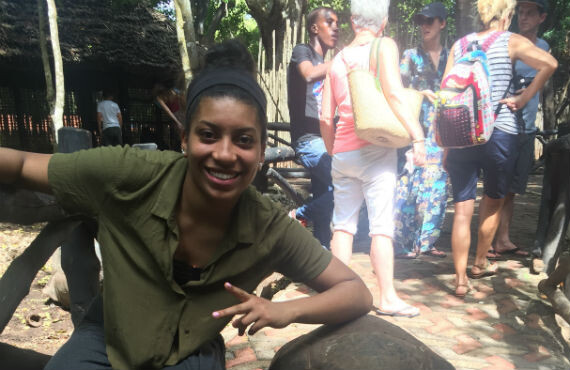The Journey Is the Destination in Penn Global Seminar
(In the first of a two part series on the University of Pennsylvania’s inaugural Penn Global Seminars, undergraduates share what they learned traveling to Morocco and Zanzibar as part of the study-abroad component of one of the seminar courses.)
During her first three years at the University of Pennsylvania, Brittany DeClouette wanted to study abroad as part of her college experience but didn’t. As a busy pre-med student she thought she would not graduate on time if she left campus for a full semester or academic year. So, when she learned about the new Penn Global Seminars that have one-week of study abroad embedded, she leapt at the opportunity to enroll.
DeClouette successfully applied to the Penn Global Seminar “Blends of Cultures: Understanding Conflict and Cooperation in Africa.”
Led by Penn faculty, students spent one week studying in Morocco or Zanzibar during spring break.
Like DeClouette, most of the 24 undergraduates were seniors. She and 13 of the students went to Zanzibar. Ten travelled to Morocco.
The course was co-taught by Amel Mili, Arabic Language and Culture Program director at Penn’s Joseph H. Lauder Institute of Management & International Studies, and Keren Weitzberg, a postdoctoral researcher affiliated with the History Department as well as Lauder. Mili familiarized students with the economic, political and social realities of Morocco. Weitzberg taught them about Zanzibar culture and history.
On campus and abroad, students immersed themselves in literature on African intercultural conflict, cooperation and history such as the 1964 Zanzibar Revolution.
DeClouette says: “The local people often twist and gloss over the details of the Zanzibar Revolution because some people on the island are still discontent with what happened. Therefore, the readings always gave us brute information of what happened, but seeing the information we read about manifested in practice on the island was sometimes different. Even professors from the region differed based on their nationalist perspectives.”
The 14 students who went to Zanzibar were guided by Weitzberg and taught by professors at the State University of Zanzibar.
In Morocco, the group of 10 visited Marrakesh, “the gate to Africa,” and other sites, guided by Lauder professor Mili.
They traversed the country each day on bus trips made somewhat longer by local drivers who didn’t use GPS. Their preferred navigation method: stopping to ask someone for directions.
“We got lost,” Mili says, laughing, as she recalled misadventures that turned into learning opportunities. “But by getting lost we were exploring, we were discussing, so usually the trip would be two hours, but we would get lost an additional hour. What to do to get the driver to believe in GPS and not the map? I don’t know.”
The students in Morocco learned from both the academics and locals. Hiking through the High Atlas Mountain, they saw houses that were built into the mountain and met local women artisans at the Anou Cooperative.
Their days of exploration continued in the homes of their host families.
“It’s amazing how much they loved the home stay because I was expecting some resistance,” Mili says. “You don’t have your freedom.”
But the students were delighted to experience the authenticity of day-to-day life.
“I speak French,” says Mash Otubu, a junior from Nigeria. “The host mother and a lot of people in the community speak French so that allowed us to communicate.”
He also interacted with some exchange students from another university doing study abroad in Rabat, the capital of Morocco.
“It was interesting looking at how Morocco evolved, seeing different dynasties, how Morocco was at a crossroad of cultures,” Otubu says. “We studied it a bit in class but to see that firsthand, it really drove it home for me.
The trip posed some challenges for students who don’t speak French or Arabic. David Scollan, a Mahopac Falls N.Y., junior speaks Swahili fluently but it's not a language commonly spoken in Morocco. He says, however, in his two-day stay with a Moroccan host family he still learned much about the culture. He was surprised to learn that the host mother works outside the home as a party planner.
“A lot of people perceive the culture as very traditional and conservative where women are subjugated, but a lot of it really depends — like in the U.S. — whether someone is more conservative or traditional. Same thing in Morocco,” he observes.
Otubu and Scollan are now veterans of the Penn Abroad programs, having studied for a full semester last fall, Otubu in Senegal and Scollan in Tanzania.
By embedding one week of study abroad in its courses, the Global Seminars give students another study-abroad option while increasing engagement between students and their professors.








